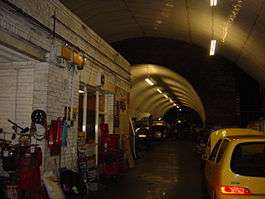Dingle railway station
| Dingle | |
|---|---|
|
Dingle in 2005 | |
| Location | |
| Place | Liverpool |
| Area | England |
| Operations | |
| Original company | Liverpool Overhead Railway |
| History | |
| 21 December 1896 | Station opened |
| 30 December 1956 | Station closed |
| Disused railway stations in the United Kingdom | |
|
Closed railway stations in Britain A B C D–F G H–J K–L M–O P–R S T–V W–Z | |
|
| |
Dingle railway station is a disused underground railway station located on the Liverpool Overhead Railway (LOR), at the south end of Park Road, Dingle, Liverpool. It was the only below ground station on the line.[1] Trains accessed the station via a half-mile underground tunnel, bored from the cliff face at Herculaneum Dock to Park Road. It is the last remaining part of the Overhead railway, with the surface entrance still standing and the former platform and track area in use as a garage called Roscoe Engineering.[1]
History
.jpg)
The extension to a new southern terminus at Dingle was opened on 21 December 1896[2] with the first trains leaving from Dingle station at 5am that morning, carrying a large number of dock workers.[3] There were plans for the tunnel to extend further inland with a few more stations when funds were available.
On the evening of the 23 December 1901 a motor on a train pulling into the station fused, causing large amounts of sparking, which ignited a stack of wooden sleepers by the railside. The resulting fire spread to the train carriages and station and resulted in the deaths of six people; the train's guard and driver, the station foreman, a carriage cleaner, and two passengers.[4][5] The general manager of the railway stated that the fusing would "scarcely have caused £5 worth of damage" if not for the wind which was blowing into the tunnel and fanning the flames.[6] The station was closed for more than a year.[7]
Along with the rest of the Liverpool Overhead Railway, the station closed permanently on 30 December 1956.
At approximately 11:30am on 24 July 2012, part of the tunnel near Dingle railway station collapsed. A number of homes above this section of the tunnel were evacuated.[8][9] In October 2013 work commenced to repair the tunnel,[10] with residents allowed back into their homes in February 2014.[11]
| Preceding station | Disused railways | Following station | ||
|---|---|---|---|---|
| Terminus | Liverpool Overhead Railway | Herculaneum Dock | ||
References
- ↑ Bolger, Paul (2004-11-22). "Site Name: Liverpool Overhead Railway & Dingle Station". Subterranea Britannica. Retrieved 2007-09-19.
- ↑ "Liverpool Overhead Railway: The Southern Extension Opened for Traffic". Liverpool Echo. 21 December 1896. p. 4.
- ↑ "Appalling Disaster in Liverpool: Overhead Railway on Fire". Liverpool Echo. 24 December 1901. p. 4.
- ↑ "The Dockers' Umbrella: City railway served Liverpool's busy port". Liverpool Echo. 23 April 2008. Retrieved 2 August 2015.
- ↑ "The Overhead Railway Disaster: The Terrible Scene This Morning". Liverpool Echo. 24 December 1901. p. 5.
- ↑ Paul Wright (2010). Lost Termini of North West England. Silver Link Publishing. p. 117. ISBN 9781857943160.
- ↑ "Toxteth train tunnel collapse investigated". BBC News. BBC. Retrieved 10 August 2012.
- ↑ "Homes near Toxteth tunnel collapse checked for safety". BBC New. BBC. Retrieved 10 August 2012.
- ↑ "Work to begin on repairing collapsed Liverpool Overhead Railway tunnel". Liverpool Echo. Liverpool Eco. Retrieved 7 October 2013.
- ↑ "Dingle tunnel collapse families anger at repair costs". BBC News. 12 May 2014. Retrieved 13 August 2015.
- Butt, R. V. J. (1995). The Directory of Railway Stations: details every public and private passenger station, halt, platform and stopping place, past and present (1st ed.). Sparkford: Patrick Stephens Ltd. ISBN 978-1-85260-508-7. OCLC 60251199.
- Jowett, Alan (March 1989). Jowett's Railway Atlas of Great Britain and Ireland: From Pre-Grouping to the Present Day (1st ed.). Sparkford: Patrick Stephens Ltd. ISBN 978-1-85260-086-0. OCLC 22311137.
External links
| Wikimedia Commons has media related to Dingle railway station. |
Coordinates: 53°22′53″N 2°57′30″W / 53.3814°N 2.9584°W



.jpg)